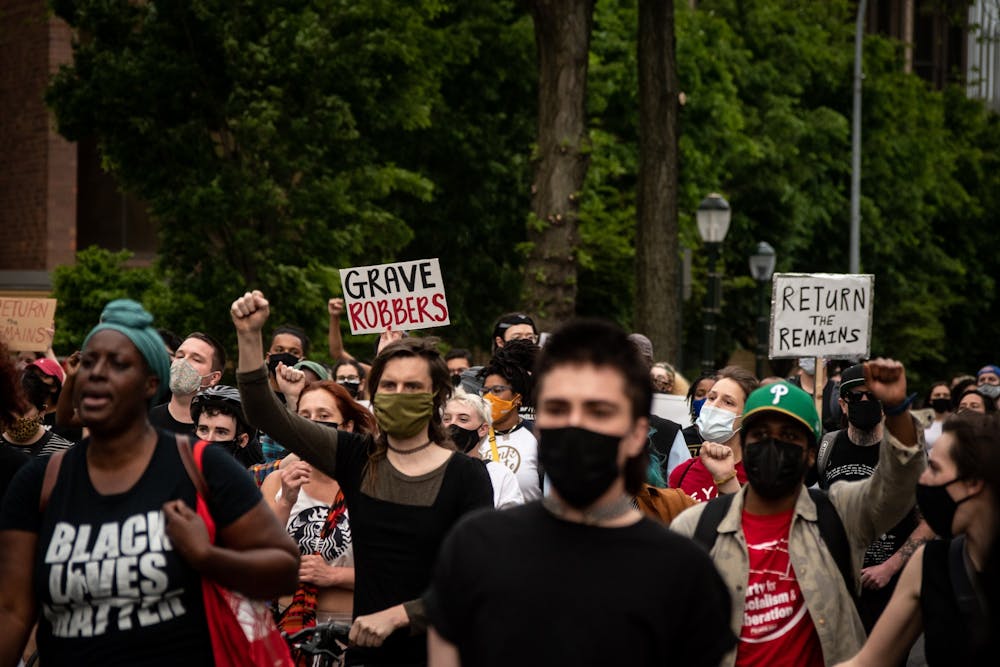
Community members march down Spruce Street during a protest demanding the immediate return of the MOVE bombing victims' remains from the Penn Museum on April 28.
Credit: Max MesterEarlier this year, Penn was the subject of national controversy when it was discovered that the Penn Musuem was in possession of the remains of a victim from the 1985 MOVE bombing.
In 1985, the Philadelphia city government bombed a home on Osage Avenue that housed MOVE, a Black liberation advocacy group. The bombing had killed 11 people, including five children aged seven to 13, and destroyed 61 homes in the neighborhood, leaving 250 local residents without a home.
A forensic anthropologist hired by the MOVE Philadelphia Special Investigation Committee identified some remains as belonging to a bombing victim.
The remains were previously in the custody of now-retired professor Alan Mann, who received the remains from the city in the 1980s after the Philadelphia Medical Examiner’s Office asked for assistance in identifying them. Mann later studied the remains with Janet Monge, curator of the Penn Museum's physical anthropology section, Billy Penn previously reported, before taking them with him to Princeton University. The remains, a pelvic bone and a femur, were transferred back and forth from Penn to Princeton for over 35 years.
Members of the Africa family called on the Penn Museum to return the remains and demanded an official apology from Penn and Princeton, as well as financial reparations and the immediate termination of Monge from her positions.
April 21 — The Inquirer published an op-ed by West Philadelphian Abdul-Aliy Muhammed that exposed the Penn Museum's possession of the remains from the 1985 bombing. Muhammed criticized Penn’s possession of the remains while simultaneously committing to repatriate the remains found in the Morton Collection.
April 23 — Anthropology Department Chair Kathleen Morrison spoke out against the Penn Museum's possession of the remains in an email to anthropology students, faculty, and staff.
Morrison pledged to develop a more comprehensive framework for using human remains in teaching instead of the “minimal” guide currently provided by the Penn Museum. Morrison also wrote that the Anthropology Department is creating a content warning system to alert students if classes involve the handling of human remains.
April 26 — The Penn Museum issued an apology to members of MOVE and the University community for its possession of the remains.
Penn President Amy Gutmann and Provost Wendell Pritchett also released a statement condemning the possession of the remains. Gutmann and Pritchett also announced that the University had hired attorneys from the Tucker Law Group to investigate how the Penn Museum came in possession of the remains.
Members of MOVE rejected the apology in a press conference and reiterated their demands of an immediate return of the remains, an apology from Princeton and Coursera, financial reparations, and the termination of Monge from her positions in the Penn Museum and the Anthropology Department.
April 28 — The Penn Museum and University administrators issued a second apology for housing the remains. In the statement, Pritchett and Penn Museum Director Christopher Woods wrote that they are working toward a resolution with the Africa family.
"While the remains recovered from the MOVE house were not part of the Museum collection, it could not be clearer that this same standard should be applied here as well — these remains should be returned to the Africa family as soon as possible," the email read. "The research of our physical anthropologists was done in the interests of serving our community, but by any measure 36 years is far too long to have waited."
April 28 — More than 300 West Philadelphia and Penn community members gathered outside the Penn Museum to demand the immediate return of the remains and to honor the lives of Tree and Delisha Africa, whose remains the Africa family believes were held by the Museum. Protesters marched from the Penn Museum to Gutmann’s home on 3812 Walnut St.
During the demonstration, the Africa family and members of Black Lives Matter Philadelphia criticized Penn’s apology and the treatment of the remains. Mike Africa, Jr. also shared memories of Tree and Delisha Africa and emphasized the importance of honoring their lives.
Penn’s Department of Africana Studies also published a guest column condemning Penn’s treatment of the remains, urging for the University’s Board of Trustees to be held accountable and for the Penn Museum to report the use of the remains as a violation of Institutional Review Boards protocol.
July 2 — The remains are returned to the Africa family after more than 30 years. MOVE members received the remains from the Terry Funeral Home in West Philadelphia, which arranged to pick up the remains from Mann’s home, WHYY reported.
Aug. 20 — Penn’s investigation into the mishandling of the remains concluded that Mann and Monge demonstrated "extremely poor judgment and gross insensitivity" for retaining the remains.
Correction: A previous version of this article inaccurately states that the Penn Museum was in possession of the remains of both 1985 MOVE bombing victims Tree and Delisha Africa. An investigation by TLG concluded that only one unidentified victim's remains were housed by the Penn Museum. The DP regrets this error.
The Daily Pennsylvanian is an independent, student-run newspaper. Please consider making a donation to support the coverage that shapes the University. Your generosity ensures a future of strong journalism at Penn.
Donate






